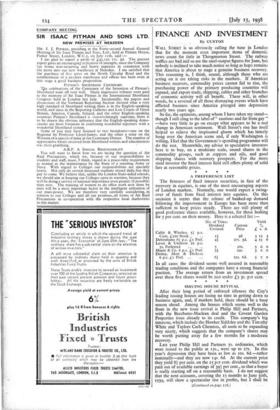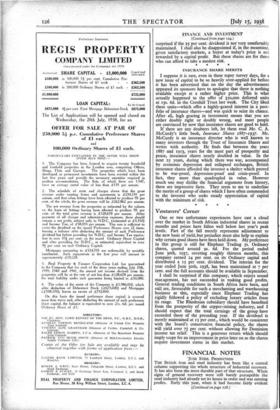FINANCE AND INVESTMENT
, By CUSTOS
WALL STREET is so obviously calling the tune in London that for the moment even important. items of domestic news count for little in Throgmorton Street. The railway traffics are bid and so are the steel-output figures for June, but nobody is inclined to take much notice so long as hop° remains that America is about to stage a genuine business recovery. This reasoning is, I think, sound, although those who are acting on it are taking risks in the markets. If American business recovers, commodity prices cannot fail to rise, the purchasing power of the primary producing countries will expand, and export trade, shipping, cables and other branches of economic activity will all benefit. There will; in other words, be a reversal of all those dismaying events which have afflicted business since America plunged into depression nearly two years ago. So far, the optimists, among whom I have taken my stand— though I still cling to the label of" cautious and far from gay " —have very little to go on except what appears to be a real change in American sentiment. Wall Street's rise has itself helped to relieve the inspissated gloom which has latterly hung over the American scene and, if only Washington is willing, I feel that the Government's spending programme will do the rest. Meanwhile, my advice to speculative investors here is to buy, on a moderate scale, sound shares in the commodity groups, such as coppers and oils, and good shipping shares with recovery prospects. For the more staid investor the fixed interest field still offers plenty of solid fare at reasonable prices. * * * * A PREFERENCE LIST The firmness of fixed interest securities, in face of the recovery in equities, is one of the most encouraging aspects of London markets. Normally, one would expect a swing- over of funds from fixed interest into equities. On this occasion it seems that the release of banked-up demand following the improvement in Europe has been more than sufficient to keep prices steady. There are still plenty of good preference shares available, however, for those looking for 5 per cent. on their money. Here is a selected list :-
Cable & Wireless 5i p.c.
No. of Times Dividend Covered
Current Price Yield
0/
/0
£ s. d.
Cum. Lioo Stock..
98 5 12 3 Debenhams 6i p.c. £1 Pref. 27s. 3d. 4 15 6
Lever & Unilever zo p.c.
5s. Preferred .. 5 20S. 5 0 0
Maple & Co. 6 p.c. Li Pref. 31
245. 5 o Denny, Mott & Dickson 6 p.c. Li Pref. 61 22s. 6d.
5 7 o In all cases the dividend seems well assured in reasonable trading conditions and the companies have a strong financial position. The average return from an investment spread over these five shares would be just under £5 3s. per cent. * * * *
ISSUING HOUSE REVIVAL
After their long period of enforced idleness the City's leading issuing houses are losing no time in getting down to business again, and, if markets hold, there should be a busy season ahead. ,Among the houses which seems well to the front in the new issue revival is Philip Hill and Partheq, with the Beechams-Maclean deal and the Covent Garden Properties issue already to its credit. This company's big interests, which include the Hawker Siddeley and the Timothy White and Taylors Cash Chemists, all seem to be expanding very nicely, which suggests that the company's shares may be worth putting away for a few months for a moderate recovery.
Last year Philip Hill and Partners 5s. ordinaries, which were issued to the public at 15s., were up to 27s. In .thii year's depression they have been as low as los. 6d.—rather nominally—and they are now 1 ts. 6d. At the current price they yield 84 per cent. on the 25 per cent. dividend which was paid out of available earnings of 394 per cent., so that a buyer is -really starting off on a reasonable basis. I do not suggest that the next accounts,, covering the 15 months to June 3oth, 1939, will show a spectacular rise in profits, but I shall be (Continued on page 126.) FINANCE AND INVESTMENT (Continued from page 124.) surprised if the 25 per cent: dividend is not'very comfortably maintained. I shall also be disappointed if, in the meantime, given satisfactory markets, a buyer at today's price is not rewarded by a capital profit. But these shares are for those who can afford to take a modest risk. * * * *
INSURANCE SHARE MERITS
I suppose it is rare, even in these topsy turvey days, for a new issue of capital to be so heavily over-applied for before it has been advertised that on the day the advertisement appeared its sponsors have to apologise that there is nothing available except at a rather higher price. This is what actually happened to the offer of 350,000 deferred units at 13s. 6d. in the Cornhill Trust last week. The City liked these units—which offer a highly-geared interest in a port- folio of insurance shares—and was quick to seize its chance. After all, high gearing in investment means that you are either doubly right or doubly wrong, and most people are convinced by now that insurance shares are good to hold.
If there are any doubters left, let them read Mr. C. A. McCurdy's little book, Insurance Shares 1887-1937. Mr. McCurdy is an insurance director who is well known to many investors through the Trust of Insurance Shares and writes with authority. He finds that between the years 1887 and 1913, years for the most part of prosperity and peace, insurance shares nearly doubled in value. In the next 25 years, during which there was war, accompanied by economic depression and collapsed exchanges, British insurance shares afforded the investor a shelter which proved to be war-proof, depression-proof and crisis-proof. In fact, they more than quadrupled in value. However much one may dislike the financial argument from history, these are impressive facts. They seem to me to underline the merits of a group of shares which I have often commended to the investor who seeks steady appreciation of capital with the minimum of risk.
* * * *
Venturers' Corner
One or two unfortunate experiences have cast a cloud over the market in South African industrial shares in recent months and prices have fallen well below last year's peak levels. Part of the fall merely represents adjustment to the new basis of yield, but prejudice must also help to explain why certain good shares have been held down. My preference in this group is still for Elephant Trading 5s. Ordinary shares, quoted around 9s. 6d. For the period ended June 3oth, 1937, covering roughly thirteen months, this company earned 24 per cent. on its Ordinary capital and distributed a 15 per cent. dividend. The interim for the year ended June 3oth, 1938, has been maintained at 7 per cent. and the full accounts should be available in September.
I shall be surprised if this company, which enjoys sound mat agement, has not succeeded in making good profits. General trading conditions in South Africa have been, and still are, favourable for such a merchanting and warehousing business as this, especially since Elephant Trading has rigidly followed a policy of excluding luxury articles from its range. The Rhodesian subsidiary should have benefited from the prosperity of the copper-mining industry, and I should expect that the total earnings of the group have exceeded those of the preceding year. If the dividend is merely maintained at 15 per cent., which would be consistent with the board's conservative financial policy, the shares will yield over 7i per cent. without allowing for Dominion income tax relief. This is a generous return which should imply scope for an improvement in price later on as the shares acquire investment status in this market.











































 Previous page
Previous page